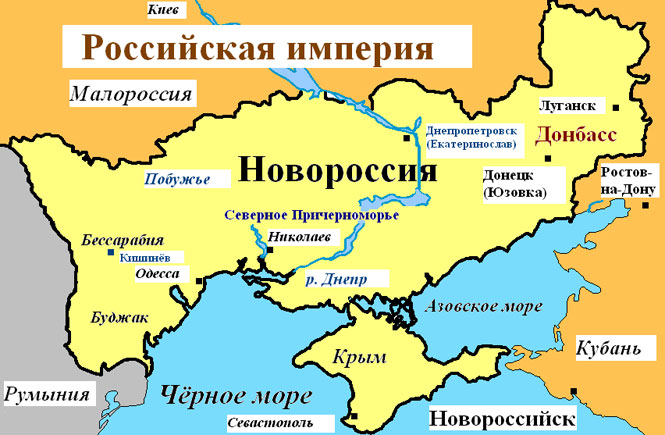Archive for April, 2014
Новороссия, о чем идет речь?
30 Apr 2014В.Путин:
Вопрос ведь даже не в этом – вопрос в том, чтобы обеспечить законные права и интересы русских и русскоязычных граждан юго-востока Украины – напомню, пользуясь терминологией ещё царских времён, это Новороссия: Харьков, Луганск, Донецк, Херсон, Николаев, Одесса не входили в состав Украины в царские времена, это всё территории, которые были переданы в Украину в 20-е годы советским правительством. Зачем они это сделали, бог их знает. Это всё происходило после соответствующих побед Потёмкина и Екатерины II в известных войнах с центром в Новороссийске. Отсюда и Новороссия.
—
1. В истории существовало четыре административно-территориальных образования, в названии которых присутствовал термин «Новороссия»
2. Термин «Новороссия» не мог произойти от названия города «Новороссийск», так как Екатеринослав (нынешний Днепропетровск) был переименован в Новороссийск только в 1796 г.
3. Новороссийская губерния впервые была создана Высочайшим указом от 22 марта 1764 г., причем не после и не в результате побед Г.Потемкина и Екатерины II в русско-турецких войнах 1768-1774 гг. и 1787-1792 гг., а до них.
4. Губернским городом первой Новороссийской губернии (1765-1783 гг.) был назначен и оставался во весь период ее существования город Кременчуг.
5. Название Кременчуг имеет татарские корни.
6. Кременчуг являлся сотенным местечком Чигиринского полка Войска Запорожского.
7. В 1783 г. первая Новороссийская губерния была упразднена и на ее месте было образовано Екатеринославское наместничество. Административным центром наместничества в 1783-89 гг. оставался город Кременчуг.
8. Екатеринослав был основан в 1787 г. В 1789 г. он стал центром Екатеринославского наместничества (1783-1796 гг.).
9. Во второй раз Новороссийская губерния была образована Павлом I в 1796 г.
10. Новороссийское генерал-губернаторство было создано Александром I в 1802 г. в составе Екатеринославской, Таврической и Херсонской губерний.
11. С 1822 г. генерал-губернаторство стало называться Новороссийским и Бессарабским.
12. Центрами Новороссийского и Новороссийского и Бессарабского генерал-губернаторств были последовательно города Екатеринослав (1802-1803 гг.), Николаев (1803-1805 гг.), Одесса (1805-1873 гг.).
13. Административно-территориальные единицы под названием «Новороссийская губерния» существовали в общей сложности в течение 24 лет (1765-1783 гг. и 1796-1802 гг.). В течение более двух столетий (с 1802 г.) в Российской империи и СССР не было Новороссийских губерний и областей. С 1874 г. не существует иных административных единиц с термином «Новороссия» в своем названии.
14. Харьков никогда не входил ни в одну административно-территориальную единицу, в названии которой присутствовал бы термин «Новороссия».
15. В «царские времена» территория Новороссии не входила и не могла входить в состав Украины.
16. По данным переписи 1897 г. на территориях Таврической губернии (Херсонская область и АР Крым), а также Кубанской области (в основном совпадавшей с территорией нынешнего Краснодарского края) малороссов (украинцев) жило больше, чем великороссов (русских).
17. Советское правительство в 1920-е годы никаких земель Украине не передавало. Скорее наоборот.
18. По договору от 12 июня 1918 г. РСФСР признавала Украинскую Державу и ее границы, включая и ее восточную и северную границы, проходившие восточнее и севернее, чем современные границы между Украиной и Россией, Украиной и Беларусью.
19. Стоит также обратить внимание на то, что граница между Украиной и Россией проходила в соответствии с этническим принципом в Крыму.
20. На Парижской мирной конференции 1919 г. обсуждение происходило в соответствии с картой Украины, согласно которой части нынешних Брянской, Курской, Воронежской, Ростовской областей, а также почти полностью современные Белгородская область и Краснодарский край России входили в состав Украины.
21. Расселение украинцев далеко за пределы современных границ Украины признавалось большевиками еще в конце 1920-х гг. – см. подготовленную в 1928 г. Академией наук СССР карту распространения восточнославянских языков. 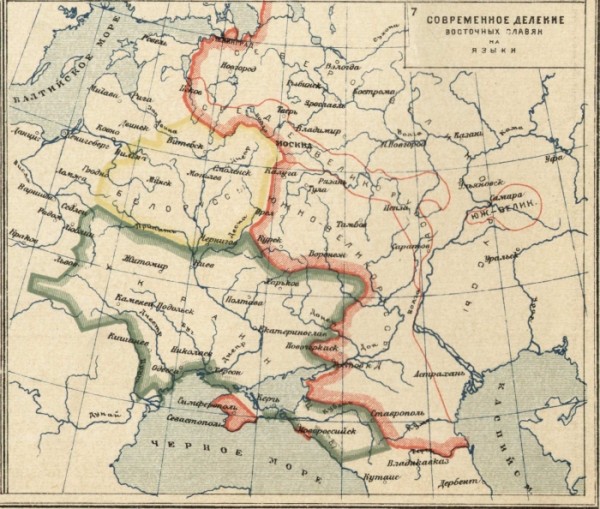
Blog – Andrei Illarionov.
Pope Francis has declared Popes John Paul II and John XXIII saints, in front of a crowd of hundreds of thousands.
He praised his two predecessors as “men of courage” at the Vatican service, the first time in history that two popes have been canonised at the same time.
The Mass was attended by about 100 foreign delegations.
The Catholic Church’s two newest saints were “popes of the twentieth century” and “were not afraid to look upon the wounds of Christ,” said Pope Francis on Sunday.
“They lived through the tragic events of that century, but they were not overwhelmed by them,” Pope Francis said in his homily. “For them, God was more powerful; faith was more powerful — faith in Jesus Christ the Redeemer of man and the Lord of history.” 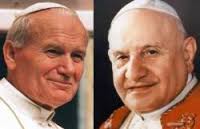
Earlier in the Mass, also attended by Pope Emeritus Benedict XVI, Pope Francis read the formal proclamation of sainthood during the canonization rite. The crowd roared with applause upon hearing their names read in Latin in the official proclamation.
Pope Francis described Saint John XXIII as “the pope of openness to the Spirit” and Saint John Paul II as “the pope of the family“, each description followed by applause.
Pope Francis also underlined the deep faith of his two predecessors: “These were two men of courage, filled with the parrhesia of the Holy Spirit, and they bore witness before the Church and the world to God’s goodness and mercy.”
The two new saints “teach us to enter ever more deeply into the mystery of divine mercy,” he concluded.
Analysts say Francis is trying to balance the conservative legacy of John Paul with the reforming zeal of John.
Source: Vatican Radio
OSCE, in Slavyansk not monitors, but Military verification team sent from OSCE countries.
26 Apr 20141/4 Comms with military observers in Donetsk region lost.Team not OSCE monitors but sent by States under Vienna Doc on military transparency
7:35 PM – 25 Apr 2014
2/4 All members of the OSCE Special Monitoring Mission and OSCE/ODIHR election observers are safe and accounted for
7:36 PM – 25 Apr 2014
3/4 Military verification team – led by Germans – and composed of 8 members – 4 Germans, 1 Czech, 1 Danish, 1 Polish, 1 Swedish
7:36 PM – 25 Apr 2014
4/4 Military verification team sent following invitation from Ukraine under terms of Vienna Document 2011
7:37 PM – 25 Apr 2014
Source: OSCE.org
—
The Vienna Document is an agreement between the participating states of the Organization for Security and Co-operation in Europe implementing confidence and security building measures. 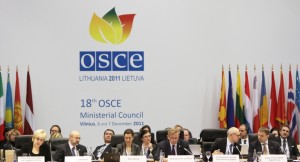
Its provisions include an annual exchange of military information about forces located in Europe (defined as the Atlantic to the Urals), notifications for risk reduction including consultation about unusual military activities and hazardous incidents, prior notification of certain military activities, observation of certain military activities, exchange of annual calendars, and compliance and verification by inspection and evaluation visits.
This exchange differs from the Global Exchange of Military Information in that it is limited to forces in Europe, while the Global Exchange of Military Information applies to all forces of the participating states, wherever located.
The annual exchange of information is conducted concurrently with the annual exchange of information under the Conventional Forces in Europe treaty, in Vienna, Austria in December of each year. The Vienna Document has been revised periodically, and the current version is the 2011 version.
From Wikipedia
—
Overview of Vienna Document 2011
Vienna Document 2011 (VD11) is composed of politically binding confidence and security-building measures (CSBMs) designed to increase openness and transparency concerning military activities conducted inside the OSCE’s zone of application (ZOA), which includes the territory, surrounding sea areas, and air space of all European (Russia from the western border to the Ural Mountains) and Central Asian participating States. A variety of information exchanges, on-site inspections, evaluation visits, observation visits, and other military-to-military contacts take place according to VD11 provisions. In the case of the United States (and Canada), only military forces and activities inside the ZOA are impacted.
VD11 builds on previous agreements: the 1975 Helsinki Final Act, the Document of the Stockholm Conference of 1986, the 1992 Helsinki Document, and the Vienna Documents of 1990, 1992, 1994, and 1999. It is part of an interlocking web of mutually enforcing agreements, including the Treaties on Conventional Arms Control in Europe (CFE) and Open Skies, which form the current European conventional arms control framework.
The EU must create an energy union to secure its gas supply because the current dependence on Russian energy makes Europe weak, Poland’s prime minister, Donald Tusk, wrote in an article in the Financial Times.
Russia, which provides around one third of the EU’s oil and gas, sent shockwaves through the international community with its military intervention and annexation of Ukraine’s Crimea peninsula in March. 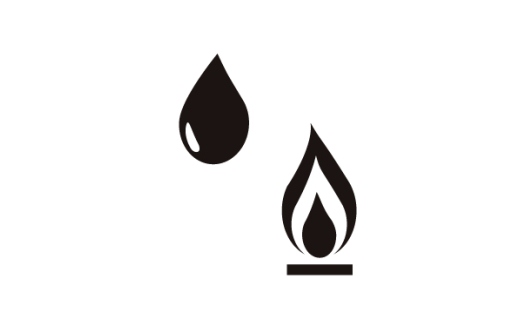
Tusk noted that the EU was creating a banking union, with a single supervisor, and a single resolution mechanism and fund to close down failing institutions.
The EU was also already jointly buying uranium for its nuclear power plants. The approach to Russian gas should be the same,.
“I therefore propose an energy union. It will return the European Community to its roots,” EU precursor the European Coal and Steel Community was formed in 1952.
Such a union should be based on several elements, he explained.
The first of these would be the creation of a single European body that would buy gas for the whole 28-nation bloc. Another would be that if one or more EU countries were threatened with being cut off from gas supplies, the others would help through “solidarity mechanisms“.
The EU must also help finance gas storage capacity and gas links in the countries most dependent on gas sold by the state-owned Russian gas monopoly Gazprom. The energy union would also seek agreements to buy gas from exporters outside Europe, such as the United States or Australia. It could be transported to Europe by ship in liquefied form.
“Today, at least 10 EU member states depend on a single supplier – Gazprom – for more than half of their consumption. Some are wholly dependent on Russia’s state-controlled gas giant,” Tusk said.
Another element was the full use of the EU’s existing fossil fuels, including coal and shale gas.
“In the EU’s eastern states, Poland among them, coal is synonymous with energy security. No nation should be forced to extract minerals but none should be prevented from doing so – as long as it is done in a sustainable way,” Tusk said.
Finally the EU should strengthen the existing Energy Community of the EU and eight of its eastern neighbours, created in 2005 to extend the European gas market eastward.
Новороссия или Малороссия?
24 Apr 2014В Одессе на Куликовом поле проголосовали за создание республики “Новороссия“. А народным президентом Одесской Новороссийской Республики избрали Валерия Каурова.
Глава Союза Православных граждан Украины Валерий Кауров обратился к собравшимся на Куликовом поле одесситам по скайпу, т. к. был вынужден уехать из города из-за угрозы ареста. Новоорбразованное федеративное государство призвано стать дружественным Российской Федерации.
Так же было объявлено, что Одесская Новороссийская Республика признает Луганскую, Донецкую, Харьковскую и Карпаторусскую Народные Республики.
Звучали призывы повсеместно утверждать и использовать историческое название 8-ми юго-восточных областей – “Новороссия”, которые лишь в начале прошлого века были подарены УССР большевистским правительством.
Владимир Путин на днях и сам поминал новороссов. В ходе “прямой линии” он невзначай заметил, что данный регион по сути украинским никогда не был, лишь в 1920-е годы с подачи большевиков эти области перешли к УССР.
“Харьков, Луганск, Донецк, Херсон, Николаев, Одесса не входили в состав Украины в царские времена, это все территории, которые были переданы в Украину в 20-е годы советским правительством, – заявил Путин. – Это все происходило после побед Потемкина и Екатерины II в известных войнах с центром в Новороссийске (нынешний Днепропетровск)”.
Материалы от malorossia.info и MK.
« … Американцы оказались «на расстояния броска» от приобретения нового авианосца — авианосца по имени Украина… Заместитель государственного секретаря США Виктория Нуланд на днях призналась: начиная с 1991 года Америка потратила на «поддержку демократии» на Украине 5 миллиардов долларов. Для рядового гражданина пять миллиардов зеленых — гигантская, поражающая воображение сумма… 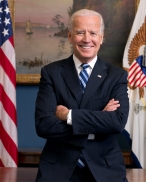
И вот сейчас у Вашингтона нежданно-негаданно появилась возможность срубить с этих трат фантастические дивиденды. Любая разумная внешняя политика основана на попытке решить свои проблемы чужими руками. Ты подбадриваешь, говоришь прочувственные, добрые и красивые слова, иногда под звуки фанфар вручаешь своему «партнеру» конверт с мелочишкой. А «другой парень» тем временем таскает для тебя каштаны из огня, мучается, обжигается, задыхается и слышит «возгласы одобрения»: «Давай снова в огонь! У тебя получается!»
С моей точки зрения, в вышенаписанном абзаце заключен весь глубинный смысл американского курса по отношению к Украине. Официальный Вашингтон рассматривает путинскую Россию как недобитого противника по холодной войне. По мнению американских стратегов, РФ давно должна была прекратить на что-либо претендовать и встроиться в ряды «младших партнеров». А так как Москва «по недомыслию» делать это отказывается, на нее натравливают самого близкого соседа и родственника… »
Статья – Михаил Ростовский – МК
Депортировать Джемилева – значит взорвать Крым.
23 Apr 2014Насчет Мустафы Джемилева хочу вот что сказать ради полной ясности.
Если все это безумие с его депортацией из Крыма в год 70-летия сталинской депортации – правда, то, видимо, на самом деле кто-то чего-то не понимает. 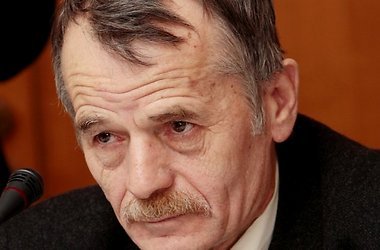
Крымские татары внесут Мустафу-ага в Крым как угодно, хоть на руках, взявшись за руки, окружив десятками тысяч человеческих тел, внесут через любые кордоны и границы. Пойдут встречать его всем Крымом, перешагнут через все блокпосты.
Не потому, что они экстремисты, – татары всегда придерживались принципа ненасильственного сопротивления, заложенного Джемилевым и его соратниками, хотя натерпелись много несправедливости и зла.
А потому, что депортация хоть одного крымского татарина, тем более Мустафы Джемилева, всемирно признанного борца за возвращение нашего народа на родину, – по степени унижения равна депортации каждого из нас. Или, если угодно, это все равно, что ударить моего ребенка, осквернить могилы моих родных.
И тогда – стреляйте, убивайте, делайте, что хотите. Это кому-то надо? Ну, тогда делайте, зная, на что идете.
Blog – Ayder Muzhdabaev – Айдер Муждабаев – Facebook
Gineva Statement on Ukraine
17 Apr 2014Representatives of the European Union, the United States, Ukraine and the Russian Federation issued today the following statement:
“The Geneva meeting on the situation in Ukraine agreed on Initial concrete steps to de-escalate tensions and restore security for all citizens. All sides must refrain from any violence, intimidation or provocative actions. The participants strongly condemned and rejected all expressions of extremism, racism and religious intolerance, including anti–semitism. All illegal armed groups must be disarmed; all illegally seized buildings must be returned to legitimate owners; all illegally occupied streets, squares and other public places in Ukrainian cities and towns must be vacated.
Amnesty will be granted to protestors and to those who have left buildings and other public places and surrendered weapons, with the exception of those found guilty of capital crimes. It was agreed that the OSCE Special Monitoring Mission should play a leading role in assisting Ukrainian authorities and local communities in the immediate implementation of these de-escalation measures wherever they are needed most, beginning in the coming days.
The US, EU and Russia commit to support this mission, including by providing monitors. The announced constitutional process will be inclusive, transparent and accountable. It will include the immediate establishment of a broad national dialogue, with outreach to all of Ukraine’s regions and political constituencies, and allow for the consideration of public comments and proposed amendments. The participants underlined the importance of economic and financial stability in Ukraine and would be ready to discuss additional support as the above steps are implemented.”
GENEVA (15 April 2014) – Misinformation, propaganda and incitement to hatred need to be urgently countered in Ukraine to avoid the further escalation of tension in the country, according to a UN human rights report* issued on Tuesday.
The report by the Office of the High Commissioner for Human Rights looks at the root causes of the protests that have taken place since November 2013, including corruption and widespread economic inequality, as well as the lack of accountability for human rights violations by the security forces and weak rule of law institutions. It also assesses the human rights situation in Crimea, including in the context of the 16 March referendum, and makes recommendations for the way forward.
“It is critical for the Government to prioritise respect for diversity, inclusivity and equal participation of all – including minorities – in political life,” said UN High Commissioner for Human Rights Navi Pillay. 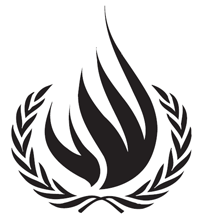
“Facts on the ground need to be established to help reduce the risk of radically different narratives being exploited for political ends. People need a reliable point of view to counter what has been widespread misinformation and also speech that aims to incite hatred on national, religious or racial grounds,” she added.
The report, which is based on information collected during two missions to Ukraine in March by Assistant Secretary-General for Human Rights Ivan Šimonović and a team of UN human rights monitors on the ground since 15 March, analyses events up to 2 April. It also anticipates and draws parallels between what happened in Crimea and events currently unfolding in eastern Ukraine.
“In eastern Ukraine, where a large ethnic Russian minority resides, the situation remains particularly tense,” the report says. “It will be important to immediately take initial measures to build confidence between the Government and the people, and among the various communities, and reassure all people throughout Ukraine that their main concerns will be addressed.”
Excessive use of force by the Berkut special police and other security forces led to the radicalisation of the protest movement, the report found. “Violations related to the Maidan protests should be investigated and addressed in order to ensure accountability of perpetrators,” the report states.
Information gathered so far indicates that 121 people were killed in violence between December 2013 and February 2014. Most acts of severe beatings, torture and other cruel, inhuman or degrading treatment were reportedly attributed to the Berkut.
The political aspects of recent developments in Crimea, which Mr Šimonović visited on 21 and 22 March, are beyond the report’s scope. However, the report notes that the situation created before and after the referendum of 16 March, which the General Assembly concluded had “no validity”, raised a number of human rights concerns pertaining to freedom of expression, freedom of assembly and other civil and political rights.
The presence of paramilitary and so-called self-defence groups as well as soldiers without insignia, was not conducive to an environment in which the will of voters could be exercised freely, and the UN Human Rights’ Office delegation received many reports of vote rigging.
“A number of measures taken in Crimea are deeply concerning from a human rights perspective,” the report says. These include the introduction of Russian citizenship, making it difficult for those who opt to maintain their Ukrainian citizenship to stay in Crimea. “The current situation also raises concerns with regard to land and property ownership, wages and pensions, health service, labour rights, education and access to justice,” the report adds.
The authorities in Crimea should also publicly condemn all attacks or harassment against human rights defenders, journalists or any members of the political opposition, the report urges, and ensure full accountability for such acts, through prompt, impartial and effective investigations and prosecutions.
It is widely assessed that while there were some attacks against the ethnic Russian community, these were neither systematic nor widespread. There are also allegations that some participants in the protests and clashes in eastern Ukraine were not from the region, and that some had come from the Russian Federation.
“What is clear from our findings is that there is an urgent need to ensure full respect for the rule of law and human rights in Ukraine and thus guarantee the enjoyment of all human rights for all, including minorities,” Pillay said.
“The international community, including the UN, can play a role in supporting the creation of such an environment. My Office and its monitoring team can provide impartial and authoritative human rights assessments to contribute to establishing the facts, de-escalating tension, and paving the way for an environment that is conducive to the holding of free and fair elections on 25 May,” the High Commissioner noted.
Among the report’s recommendations to the Government of Ukraine:
- Ensure accountability for all human rights violations committed during the unrest.
- Ensure inclusivity and equal participation in public affairs and political life.
- Prevent media manipulation by issuing timely and accurate information.
- Combat intolerance and extremism.
- Implement as a matter of priority measures to effectively eradicate corruption.
Among the recommendations to the authorities in Crimea:
- Actively resolve cases of missing persons, grant access to places of detention.
- Take all measures needed to protect the rights of persons affected by the changing institutional and legal framework, including citizenship.
- Investigate all allegations of hate speech and media manipulation.
- Ensure the protection of the rights of all minorities and indigenous peoples.
Regular reports shall be issued by the Human Rights Monitoring Mission in Ukraine (HRMMU), with one forecast for 15 May that will examine in greater depth the situation in eastern Ukraine.
ENDS
* Full report available here: http://www.ohchr.org/Documents/Countries/UA/Ukraine_Report_15April2014.doc
НАТО. Обвинения России: расставим точки над «и».
12 Apr 2014Агрессия России против Украины привела к международной изоляции России, включая полное приостановление практического сотрудничества с НАТО. Для того чтобы отвлечь внимание от своих действий, Россия выдвинула ряд обвинений против НАТО, основанных на неверной интерпретации фактов и упускающих из виду постоянные усилия НАТО по развитию партнерства с Россией. Россия также выступила с безосновательными выпадами против легитимности властей Украины и применила силу в целях захвата части территории Украины. Этот документ расставляет точки над «и».
Welcome
We are a group of long experienced European journalists and intellectuals interested in international politics and culture. We would like to exchange our opinion on new Europe and Russia.
Categories
- Breaking News (11)
- CIS (129)
- Climate (2)
- Energy&Economy (115)
- EU Eastern Dimension (85)
- Euro 2012 – Sochi 2014 – World Cup 2018, Sport (43)
- Euro-Integration (135)
- History Culture (198)
- International Policy (261)
- Military (74)
- Interviews (18)
- Italy – Italia – Suisse (47)
- Odd Enough (10)
- Poland and Baltic States (126)
- Religion (31)
- Russia (421)
- Survey (4)
- Turning points (4)
- Ukraine (176)
- Российские страницы (113)
Archives
- November 2020
- October 2020
- September 2020
- August 2020
- July 2020
- May 2020
- April 2020
- March 2020
- January 2020
- December 2019
- November 2019
- October 2019
- September 2019
- August 2019
- July 2019
- June 2019
- May 2019
- April 2019
- March 2019
- February 2019
- December 2018
- November 2018
- October 2018
- September 2018
- August 2018
- July 2018
- June 2018
- May 2018
- April 2018
- March 2018
- February 2018
- January 2018
- December 2017
- November 2017
- October 2017
- September 2017
- August 2017
- July 2017
- May 2017
- March 2017
- January 2017
- December 2016
- November 2016
- October 2016
- September 2016
- July 2016
- June 2016
- May 2016
- April 2016
- February 2016
- January 2016
- November 2015
- October 2015
- September 2015
- June 2015
- April 2015
- March 2015
- February 2015
- January 2015
- December 2014
- November 2014
- October 2014
- September 2014
- August 2014
- July 2014
- June 2014
- May 2014
- April 2014
- March 2014
- February 2014
- January 2014
- December 2013
- November 2013
- October 2013
- September 2013
- August 2013
- July 2013
- June 2013
- May 2013
- April 2013
- March 2013
- February 2013
- January 2013
- December 2012
- November 2012
- October 2012
- September 2012
- August 2012
- July 2012
- June 2012
- May 2012
- April 2012
- March 2012
- February 2012
- January 2012
- December 2011
- November 2011
- October 2011
- September 2011
- August 2011
- July 2011
- June 2011
- May 2011
- April 2011
- March 2011
- February 2011
- January 2011
- December 2010
- November 2010
- October 2010
- September 2010
- August 2010
- July 2010
- June 2010
- May 2010
- April 2010
- March 2010
- February 2010
- January 2010
- December 2009
- November 2009
- October 2009
- September 2009
- August 2009
Our books





